Democratization in the Arab world has long been hobbled by an “Islamist dilemma,” notes Brookings analyst Shadi Hamid. U.S. officials who might otherwise believe in democracy have found it more difficult to support in Arab countries because Islamist parties are the most likely to perform well and even win in free elections, he writes for Foreign Policy on the 10th anniversary of the coup in Egypt:
And in the case of Egypt in the wake of the 2011 revolution, that meant supporting the Supreme Council of the Armed Forces (SCAF), Egypt’s transitional authority that took over in 2011 after former President Hosni Mubarak stepped down, even if it meant subverting the democratic aspirations of the Egyptian people. The SCAF, Obama seemed to believe, would ensure that democracy didn’t get too out of hand. Obama admitted as much. “Our priority has to be stability and supporting the SCAF. Even if we get criticized,” he said. “I’m not interested in the crowd in Tahrir Square and Nick Kristof,” he added, referring to the New York Times columnist who had been critical of the administration’s Egypt policy.
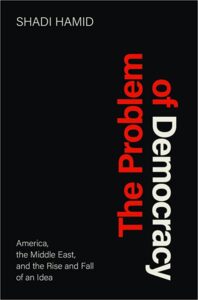 Experts are split as to whether the ouster of President Mohamed Morsi was an inevitable outcome of tensions between democracy and the military, or if it could have been prevented, Middle East Eye reports.
Experts are split as to whether the ouster of President Mohamed Morsi was an inevitable outcome of tensions between democracy and the military, or if it could have been prevented, Middle East Eye reports.
The foremost cause of the collapse of Egypt’s democratic transition was the military, said Sharan Grewal, a nonresident fellow at the Brookings Institution and author of a forthcoming book on Arab militaries and the Arab Spring. “It was aggrieved by democracy.”
“The mere presence of a politicized military like Egypt’s made negotiations more difficult between the government and opposition,” he told a forum hosted by the Project on Middle East Democracy (above). “For the secularists, why work with Morsi when you can work with the military and kick him out?”
David Kirkpatrick, New York Times’ Cairo bureau chief during the coup and author of Into The Hands Of Soldiers, challenged the notion that the democratic transition’s fate was sealed, Middle East Eye adds.
“There was going to be conflict between the Egyptian military and a democratic transition. How that conflict gets resolved… I hesitate to say is anything but inevitable,” he said. “From the moment of Mubarak’s ouster up to the coup there were repeated attempts by the military to reassert their power, and time and time again they would back down.”
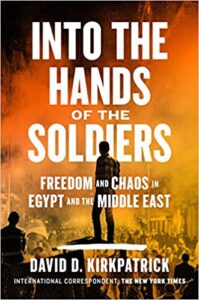 Senior U.S. defense officials tended to see democracy promotion as a luxury that distracted from counterterrorism, adds Hamid, in an article adapted from his book, The Problem of Democracy: America, the Middle East, and the Rise and Fall of an Idea:
Senior U.S. defense officials tended to see democracy promotion as a luxury that distracted from counterterrorism, adds Hamid, in an article adapted from his book, The Problem of Democracy: America, the Middle East, and the Rise and Fall of an Idea:
It was a tragic coda for a tragic region. If only briefly, the Arab Spring held the promise that the United States could finally resolve its “democratic dilemma” in the Middle East. Washington’s reliance on Arab dictators was—and still is—justified in the name of stability. Yet it is difficult to look at the Middle East of recent decades and see anything resembling a “stable” region. The uprisings of 2011 were both a reminder and a confirmation that authoritarian stability is an illusion, if not an outright oxymoron.
But some lessons are difficult to learn. If and when a second spring comes, U.S. officials will have to re-learn them all over again, Hamid suggests.
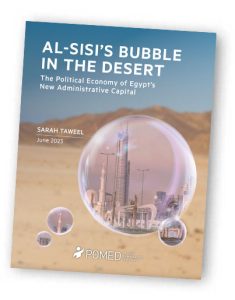
“Human rights are at an all-time low in Egypt, it’s never been this bad. Currently, in many cases the abuse is baseless, it’s just oppression for the sake of oppression,” Egyptian activist Mohamed Saad Hirala told Israel Hayom.
A report by the Washington-based POMED said that despite el-Sissi’s claim that not a penny would be taken from the state budget to build Egypt’s new capital, most of the funds do come from the state’s coffers and billions of dollars ended up in the pockets of construction companies closely affiliated with the government.
“What we find is an expanding state within a state, with resources funneled to the military regime and debt piled on to the civilian government,” said the report, Al-Sisi’s Bubble in the Desert. The project is “actually making el-Sissi’s hold on power more, rather than less, tenuous – creating bubbles in the desert, ready to pop.”
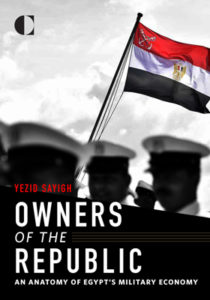
Analysts Stephan Roll and Timothy Kaldas suggest a similar solution: recognize the links between money going into Egypt and the state’s human rights abuses, Qantara.De. reports.
“It’s not the role of an external power to force Egypt to become a democracy,” said Kaldas, deputy director of the Tahrir Institute for Middle East Policy. “But the task is to just stop subsidising the autocracy and making it easier for Egypt to be a dictatorship.”
The Egyptian military has benefited most from this money, much of it from foreign lending, and has in fact grown larger and richer under Sisi, adds Roll, head of research for Africa and the Middle East at the German Institute for International and Security Affairs.
“This was a decisive factor in President Sisi’s consolidation of power,” he wrote in a December 2022 paper, “Loans for the President.” “For him, the loyalty of the armed forces has been the most important prerequisite for enforcing wide-ranging police-state repression […] Tens of thousands of political prisoners and a dramatic number of death sentences and executions even by Egyptian standards are an expression of this development.”
“Available funds do not flow into productive investments for the future, but seep into economically questionable infrastructure projects and serve, at least indirectly, to finance police-state repression.”
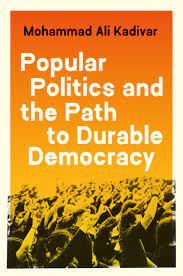
In Popular politics and the path to durable democracy, Mohammad Ali Kadivar uncovers the building blocks of durable democracies, and highlights the significance of civil society actors in sustaining mass mobilization, particularly when autocratic regimes are undergoing democratic transition, Eirin Haugseth writes for International Affairs.
Mobilization over time is associated with democratic survival; democratic transitions with lengthy mass mobilizations have led to the emergence of democratic systems of higher quality; and civil society is comparatively stronger post-transition, Kadivar states, citing two successful examples of building durable democracy (Poland and South Africa), one failure without popular mobilization (Pakistan) and a comparison of the dynamics and outcomes in a failure (Egypt) and a partial success (Tunisia).
A decade after the coup, the country’s economy is in dire straits and Sisi rules with an iron fist, France 24 adds (below). Its Cairo correspondents speak to Koert Debeuf, professor of Middle East politics at Brussels University.







